South Carolina Bankruptcy Fraud Lawyer
When an individual or business cannot manage their debts, they may file for bankruptcy with a federal court. The bankruptcy system exists to provide people with a fresh start, but people who fail to meet the necessary requirements may take advantage of this system for their own benefit. Anyone facing allegations of bankruptcy fraud may be bet with overzealous prosecutors and harsh penalties, including the potential for prison time.
With aid from a seasoned South Carolina bankruptcy fraud lawyer, you could present a strong defense of your constitutional rights to try and get your charges reduced or dismissed. Prosecutors must prove their case beyond a reasonable doubt, and a dedicated fraud attorney could gather the evidence to build a winning argument on your behalf.
Bankruptcy Fraud Under Federal Law
Filing for bankruptcy allows people or businesses in dire financial circumstances to attempt to achieve a clean slate. Whether through settling debts or wiping them out, this system is meant to help people get back on their feet. As a result, federal prosecutors do not tolerate fraudulent use of this system and tend to pursue charges at the slightest whiff of impropriety.
The crime of bankruptcy fraud is codified in 18 U.S. Code § 157. Per this statute, it is illegal to knowingly make false representations or statements with an intent to defraud the bankruptcy court throughout any step of the bankruptcy process. A dedicated South Carolina attorney could further explain the concept of bankruptcy fraud to ensure someone does not mistakenly misrepresent themselves in their petition.
Concealing Assets is Bankruptcy Fraud
The most common example of bankruptcy fraud is when a defendant conceals their assets. An attempt to hide or conceal assets in any capacity is a separate criminal offense under 18 U.S. Code § 152. However, this issue often arises during bankruptcy cases when a person has substantial debts and does not want them liquidated.
Defendants may conceal assets by:
- Hiding bank accounts
- Transferring funds to offshore banks
- Having funds or property under fictitious names
- Transferring high-value assets or accounts to another person for little or no compensation
These examples and any other attempts to hide assets from the bankruptcy court will lead to fraud charges. Federal prosecutors do not take these efforts lightly and will push for severe consequences if the defendant is convicted.
Additional Forms of Bankruptcy Fraud
Fraud charges may arise from actions at any time during the bankruptcy process—whether in the initial filing or well into the case. Beyond concealing assets, other fraudulent acts may include:
- Initiating the bankruptcy process using false information
- Using fraudulent representations in a bankruptcy petition
- Filing for bankruptcy for impermissible or fraudulent reasons
Prosecutors must prove the defendant intended to commit fraud to secure a conviction. Intent usually requires showing that the defendant knowingly took some action, made a false statement or claim, or committed a misleading act. False information on forms or lies in court may also indicate the defendant’s intent to defraud. To reduce the chances of a conviction, a skilled South Carolina attorney could sift through evidence and relevant statutes to disprove claims that a defendant had a clear intention to commit bankruptcy fraud.
A South Carolina Bankruptcy Fraud Attorney Could Defend Your Rights
If you face charges of bankruptcy fraud, you must act fast to protect yourself and your constitutional rights. These charges may lead to extremely high fines and lengthy prison sentences if you are convicted. A legal professional understands the laws regulating these charges and could help you build the best possible defense.
An experienced South Carolina bankruptcy fraud lawyer is available to speak with you about your case. Call today to schedule a consultation.




